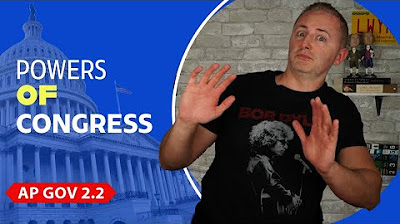In-Depth: Parliamentary Committees | 28 September, 2024
Summary
TLDRThis video offers an in-depth look at the role of parliamentary committees in India's legislative system. It explains how these committees handle complex issues by engaging with experts and government officials, ensuring thorough scrutiny of policies. The video highlights recent changes in committee chairmanships and describes how members are appointed. With 24 standing committees, these bodies contribute significantly to governance by discussing matters that cannot be fully addressed in Parliament sessions. The video also touches on the history of parliamentary committees, tracing their origins to the British Parliament.
Takeaways
- 🏛️ The Parliament of India has a supreme legislative body with visible work televised during the budget, Monsoon, and winter sessions.
- 🔍 Parliamentary committees are crucial forums for in-depth discussion on complex matters with technical expertise, often behind closed doors.
- 📈 There are 24 departmentally-related parliamentary standing committees, each overseeing a set of Ministries and examining policy issues.
- 🛠️ These committees were first established in 1993 to help Parliament manage the growing complexity of governance.
- 🗣️ Parliamentary committees are critical as they allow for detailed discussion and scrutiny, which is not always possible in the full Parliament due to the large number of members.
- 📝 Each standing committee consists of up to 31 members, with 10 nominated by the chairman from the Rajya Sabha and 21 by the speaker from the Lok Sabha.
- 📑 Committees review demands for Grants, examine bills, consider annual reports, and long-term policy documents related to their Ministries.
- 🔄 Recent changes have been made in the membership of several parliamentary committees, with new chairpersons appointed.
- 👥 The nomination process for committee members involves mutual agreement among parties, with leaders submitting names for consideration by the presiding officers.
- 📜 The practice of parliamentary committees has roots in the British Parliament, with the first committee formed in 1571 and the Public Accounts committee in 1861.
Q & A
What is the primary function of parliamentary committees in India?
-Parliamentary committees in India provide a forum for members to engage with domain experts and government officials, helping them to better understand complex matters that often require technical expertise. They also help in building consensus across political parties and are critical for scrutinizing and preparing detailed discussions on various subjects.
How often does the Indian Parliament meet?
-The Indian Parliament meets for three sessions in a year: the budget, monsoon, and winter sessions.
What are the closed-door meetings of parliamentary committees used for?
-Closed-door meetings of parliamentary committees allow members to freely question and discuss issues without the public eye, facilitating open and frank discussions.
How many departmentally related parliamentary standing committees are there in India?
-There are 24 departmentally related parliamentary standing committees in India.
When were the parliamentary standing committees first set up in India?
-The parliamentary standing committees were first set up in 1993 in India.
What is the maximum number of members allowed in each standing committee of the Indian Parliament?
-Each standing committee of the Indian Parliament consists of not more than 31 members.
Who nominates the members of the standing committees from the Rajya Sabha?
-The Chairman of the Rajya Sabha nominates 10 members from the Rajya Sabha to each standing committee.
What are the responsibilities of the standing committees regarding the related Ministries and departments?
-The standing committees are responsible for considering and reporting on the demands of Grants of the related Ministries and departments, examining bills, and considering annual reports and policy documents referred to them.
Who was appointed as the chairman of the committee on education, women, children, sports, and youth affairs?
-Digvijay Singh was appointed as the chairman of the committee on education, women, children, sports, and youth affairs.
What is the process for nominating members to the parliamentary committees?
-The parties mutually agree and leaders submit names of members for consideration by the presiding officers. The presiding officers then nominate members to the committees, ensuring that a member doesn't serve on a committee for more than two terms in a row.
What is the origin of the institution of parliamentary committees?
-The institution of parliamentary committees has its origins in the British Parliament, with the first parliamentary committee constituted in 1571 and the Public Accounts committee established in 1861.
Outlines

このセクションは有料ユーザー限定です。 アクセスするには、アップグレードをお願いします。
今すぐアップグレードMindmap

このセクションは有料ユーザー限定です。 アクセスするには、アップグレードをお願いします。
今すぐアップグレードKeywords

このセクションは有料ユーザー限定です。 アクセスするには、アップグレードをお願いします。
今すぐアップグレードHighlights

このセクションは有料ユーザー限定です。 アクセスするには、アップグレードをお願いします。
今すぐアップグレードTranscripts

このセクションは有料ユーザー限定です。 アクセスするには、アップグレードをお願いします。
今すぐアップグレード関連動画をさらに表示

AP Gov 2.2.1 | Structures, Powers, & Functions of Congress | NEW!

Masa Demokrasi Parlementer ( 1950-1959) || Materi IPS kelas 9

Module A – Indian Financial System - Topic 1

Perspective : All India Presiding Officers' Conference | 12 January, 2023

History Summarized: Ancient India

Estatuto Social da EBSERH - Parte 1
5.0 / 5 (0 votes)
